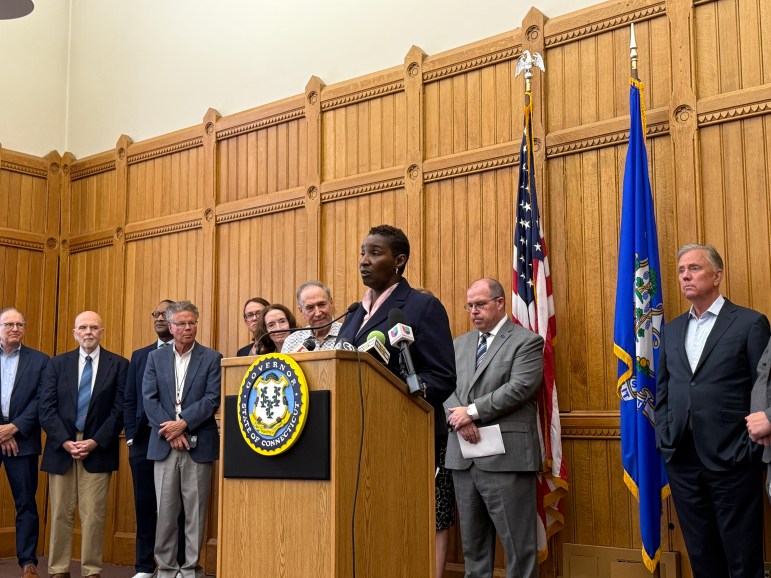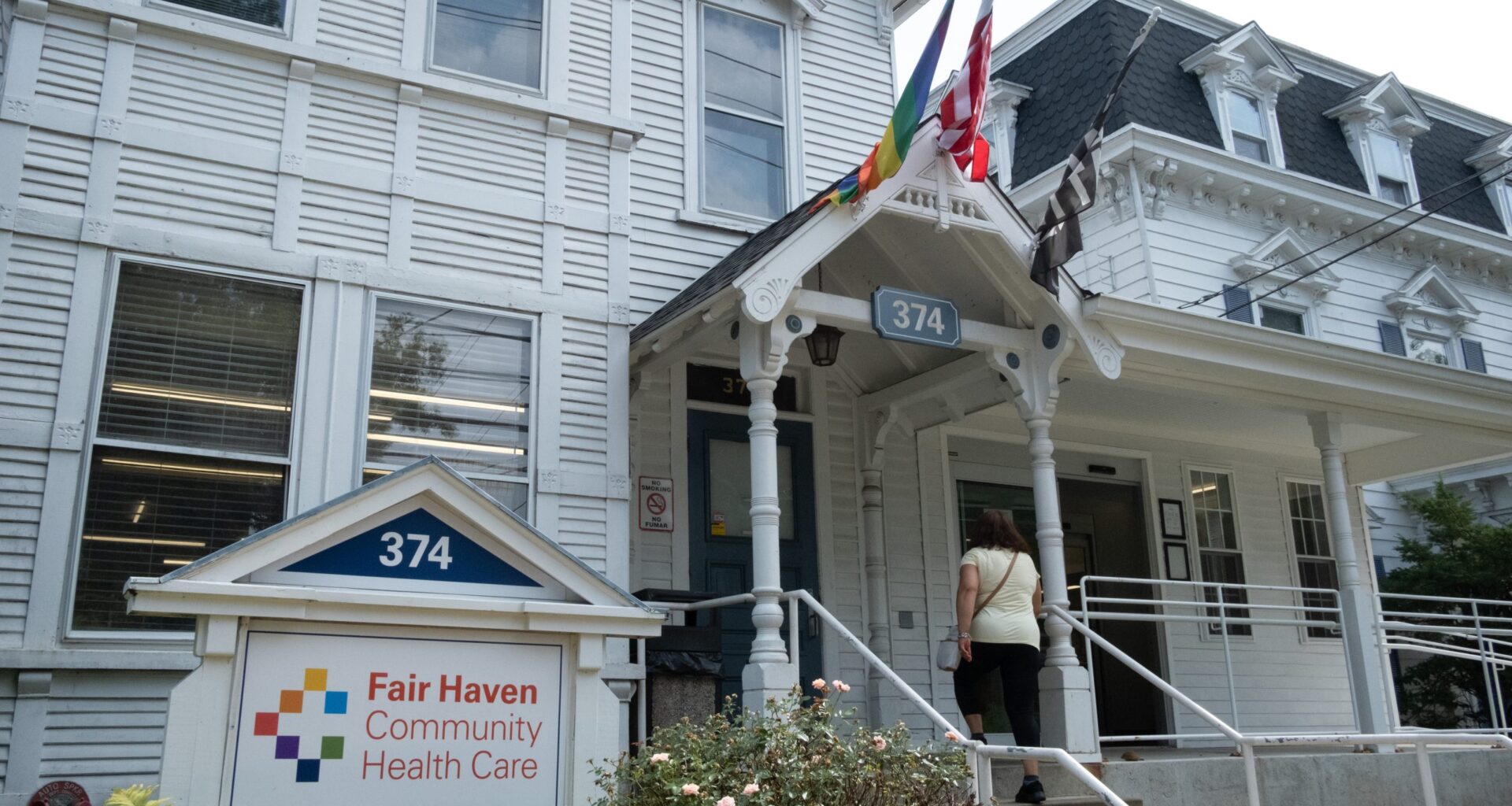Days after the Donald J. Trump administration announced that undocumented immigrants will no longer have access to certain federal benefits, including funding that supports care at community health centers, Gov. Ned Lamont encouraged all residents to continue seeking medical treatment at Connecticut’s health centers.
“This is what the federally qualified health centers do — we take care of you, no questions asked,” he said Wednesday morning at a state Capitol press conference. “I want everybody out there to know — please go take advantage of these centers. Make sure you take care of your health. It’s important for you, and it’s important for the overall community.”
Lamont said he worries about “some of the storm clouds out there” following the Trump administration’s policy change.
“We’re doing our best to keep you out of the emergency room, keep you out of more expensive care at the hospital and we’re taking care of people, no questions asked,” he said.
Federally qualified health centers across Connecticut are facing uncertainty about whether they can continue serving undocumented residents — a key patient base — following a recent move by the Trump administration to reverse a decades-old policy that gave people without permanent legal status access to certain federal benefits, including care at community health centers, behavioral health programs and Head Start.
State GOP lawmakers said the move appeared to be an attempt to avoid spending federal funds on undocumented citizens’ medical care.
“Per the administration, they have stated that these efforts are aimed at protecting taxpayer-funded benefits and vital resources for American citizens,” Senate Minority Leader Stephen Harding, R-Brookfield, and Sen. Heather Somers, R-Groton, said in a joint statement. “There does not seem to be any indication that someone who has illegal status cannot seek medical services at a federally qualified health center. The difference now is that they would have to pay for that service and the taxpayers would not be on the hook for their care.”
But leaders of the state’s federally qualified health centers say the money received through the federal Health Center Program — which is among the more than a dozen initiatives affected by the new policy — supports staffing, electronic medical records and overhead at community health centers. Uninsured patients currently pay according to an income-based sliding fee scale.
“The federal government could interpret it to say, if you’re using any federal money in your health center, you may not serve undocumented people,” said Deb Polon, chief strategy officer for the Community Health Center Association of Connecticut. “Many of the facilities have been built partially with federal funds, so maybe they’re going to say, ‘Your facility is essentially a federal facility, and you can’t serve undocumented people in that facility.’ There are so many different possible interpretations.”
For now, the FQHCs are continuing to serve everyone who shows up for care while they await further information from the U.S. Department of Health and Human Services, Polun said.
Connecticut has 17 federally qualified health centers with more than 300 facilities. The centers serve about 440,000 people annually statewide, including more than 70,000 who are uninsured.
Of those, officials estimate that anywhere from 20,000 to 60,000 patients per year are undocumented residents. The health centers don’t have a more precise number because employees do not inquire about patients’ immigration statuses, Polun said.
Legislative leaders on Wednesday criticized the Trump administration’s recent notification on community health centers.
“The latest pronouncement from the federal government this week about targeting any entity that provides services to undocumented students is a very grave potential hit,” Senate President Pro Tem Martin M. Looney, D-New Haven, said. “Fair Haven [Community Health Care in New Haven], I know, is determined to find a way to continue to serve all of its patients and to not abandon anyone.
“What is happening is a health crisis around our country,” Looney said.
House Speaker Matthew Ritter, D-Hartford, called the Trump administration’s decision, “a really stupid policy.”
“When you cut primary care, people still need it. They just go to the emergency room to get it, and then you pay for it in your health care insurance or hospitals have more uncompensated care,” Ritter said. “It’s a very backward system. The notion that somehow the federal government is going to save all this money by denying people access and denying patients — whether they be documented or undocumented, the people you care for — they’re just going to find a way to get other care or put it off until it’s more expensive.”
Without access to primary care at community health centers, Polun has said, more people will put off treatment and end up in hospital emergency departments when medical care is badly needed.
“We’ve already had patients fearful of becoming detained or deported, so we’ve seen a change in some of the behaviors — more cancelations, more, ‘Can we switch this to telehealth instead of coming in?’ This is one more obstacle, one more barrier to them being able to access health care,” she said.
The new policy could mean having to ask for and verify patients’ immigration statuses at facilities and turn away people who receive coverage through the state’s HUSKY for immigrants program, which offers government-sponsored health benefits to certain undocumented residents, officials said. As of April, 15,600 kids in Connecticut were enrolled in the program.
Aside from undocumented immigrants, access to care could also be rolled back for children covered by the Deferred Action for Childhood Arrivals (DACA) policy, refugees and individuals granted asylum under the new rule, health officials said.
On Wednesday, state leaders touted new investments they are making in federally qualified health centers.
The new budget that legislators enacted in early June calls for the state to invest at least an additional $5 million in the health centers this fiscal year. That grows to at least $12 million next year and $26.4 million by 2027-28.
 DSS Commissioner Andrea Barton Reeves announces funding secured for Medicaid reimbursement to Community Health Centers in CT for the coming three years at a press conference held July 16, 2025, at the Capitol. Credit: Janhavi Munde / CT Mirror
DSS Commissioner Andrea Barton Reeves announces funding secured for Medicaid reimbursement to Community Health Centers in CT for the coming three years at a press conference held July 16, 2025, at the Capitol. Credit: Janhavi Munde / CT Mirror
That added state spending, in turn, would leverage extra federal Medicaid dollars for the industry. The total new investment would top $15 million this fiscal year, $36 million 12 months from now, and reach $80 million by 2027-28.
That $80 million infusion represents a nearly 23% increase above the roughly $350 million in state and federal Medicaid dollars Connecticut dedicated to health centers during the fiscal year that ended June 30.
State officials have expressed fears about maintaining this support for health centers given huge cuts in federal Medicaid and other assistance ordered earlier this month by Congress and Trump.
But Lamont and the General Assembly also have prepared to supplant some of those lost federal dollars with state funds, redirecting about $600 million from a program to reduce pension debt. Legislative leaders expect to call a special session in early fall to decide how much of those dollars and other state resources should be used to offset cutbacks in federal aid.
Despite the new state investments, lawmakers said they are bracing for more Trump administration efforts to restrict health care access.
“While this is a great day for celebration,” Looney said, “recent headlines from Washington indicate there are definitely dark days ahead.”

